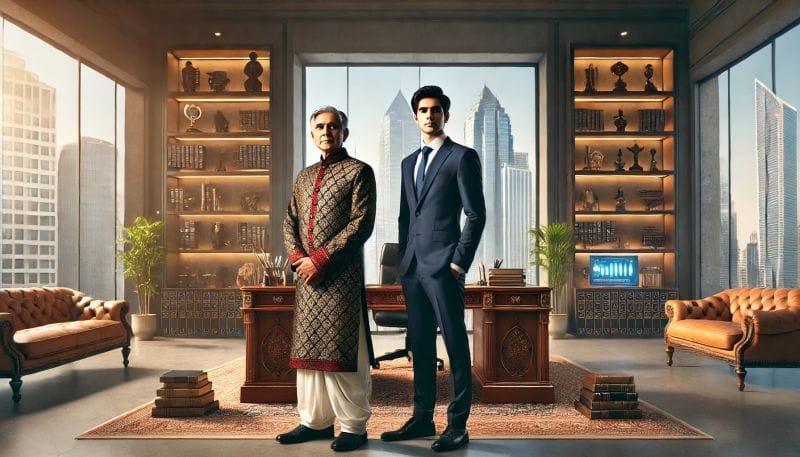Second-Generation Entrepreneurs

𝐈 𝐥𝐨𝐯𝐞 𝐞𝐧𝐭𝐫𝐞𝐩𝐫𝐞𝐧𝐞𝐮𝐫𝐬 𝐟𝐨𝐫 𝐭𝐡𝐞𝐢𝐫 𝐫𝐢𝐬𝐤-𝐭𝐚𝐤𝐢𝐧𝐠 𝐚𝐛𝐢𝐥𝐢𝐭𝐢𝐞𝐬, 𝐰𝐡𝐢𝐜𝐡 𝐛𝐫𝐢𝐧𝐠 𝐩𝐫𝐨𝐬𝐩𝐞𝐫𝐢𝐭𝐲 𝐭𝐨 𝐭𝐡𝐞𝐦𝐬𝐞𝐥𝐯𝐞𝐬 𝐚𝐧𝐝 𝐬𝐨𝐜𝐢𝐞𝐭𝐲. 𝐓𝐡𝐞𝐲 𝐚𝐥𝐬𝐨 𝐡𝐞𝐥𝐩 𝐭𝐡𝐨𝐮𝐬𝐚𝐧𝐝𝐬 𝐨𝐟 𝐩𝐞𝐨𝐩𝐥𝐞 𝐞𝐬𝐜𝐚𝐩𝐞 𝐩𝐨𝐯𝐞𝐫𝐭𝐲 𝐚𝐧𝐝 𝐥𝐞𝐚𝐝 𝐡𝐚𝐩𝐩𝐲 𝐥𝐢𝐯𝐞𝐬.
But entrepreneurs too have categories, and among those, I love first-generation entrepreneurs more than second-generation ones (This could be entirely a confirmation bias on my part, but allow me to detail this a bit more)
Over 50% of the Small and Medium businesses do not survive beyond 5 years. So when an enterprise exists for more than 20-25 years where the 2nd Gen joins in, it has defeated the odds and survived despite the adverse conditions. You have to give that credit to that 1st Gen owner.
Along with a 𝐝𝐞𝐞𝐩 𝐬𝐞𝐧𝐬𝐞 𝐨𝐟 𝐨𝐰𝐧𝐞𝐫𝐬𝐡𝐢𝐩, the 1st gen owners have demonstrated 𝐫𝐞𝐬𝐨𝐮𝐫𝐜𝐞𝐟𝐮𝐥𝐧𝐞𝐬𝐬 (when you start a business, you have limited resources and almost no network to rely upon). Having faced early challenges and uncertainties, they have 𝐬𝐭𝐫𝐨𝐧𝐠 𝐫𝐞𝐬𝐢𝐥𝐢𝐞𝐧𝐜𝐞 𝐚𝐧𝐝 𝐚 𝐫𝐞𝐦𝐚𝐫𝐤𝐚𝐛𝐥𝐞 𝐚𝐛𝐢𝐥𝐢𝐭𝐲 𝐭𝐨 𝐡𝐚𝐧𝐝𝐥𝐞 𝐬𝐞𝐭𝐛𝐚𝐜𝐤𝐬.
However, second-generation business owners get readymade access to the networks (loyal customer base, existing supplier relationships, and strong financial support). Their parents want the kids to do well, so these second-generation business owners get to study at good schools and Ivy League business colleges abroad. That probably makes them better skilled at business management.
However, not having faced the initial hardships (and learning life lessons the hard way) could challenge their EQ and limit their understanding of grass-roots issues. A good education, strong legacy and stable financial foundation may breed overconfidence that they will automatically succeed in their endeavour. (This can be quite dangerous for the business)
I understand that not all legacies are good. Inheritance brings in its own set of problems, including succession issues and division of responsibilities. However, resourcefulness is one great advantage, and if you can not build on that foundation, then there is no way you can build a business from scratch.
That's why I appreciate Mukesh Ambani, Anand Mahindra, Kumar Birla, Azim Premji & Harsh Mariwala. They leveraged their resources and built even bigger business empires without letting their advantage go to their heads.
Second-generation entrepreneurs should be considered successful only if they grow the business they inherited at least 20 times. Now, that's just a 10.5% compounded annual growth rate over 30 years. This should not be a big task in a country like India, which has 6-7% yearly inflation.
What are your thoughts? Is this the right metric to evaluate second-generation entrepreneurs? Is this target modest, or is it a tough ask?
